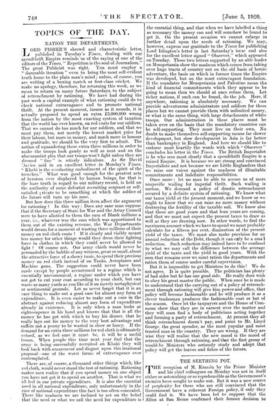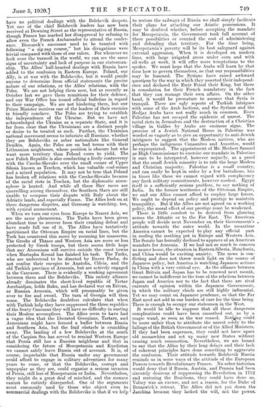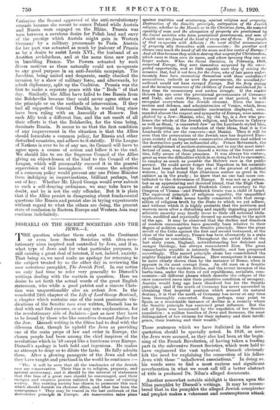THE SEETHING POT. T HE reception of M. Krassin by the
Prime Minister and his chief colleagues on Monday was not in itself either so astonishing or so reprehensible as the Government's enemies have sought to make out. But it was a new source of perplexity for those who are still convinced that the Government have a coherent Foreign policy, if only they could find it. We have been led to suppose that the Allies at San Remo confirmed their former decision to have no political dealings with the Bolshevik despots. Yet one of the chief Bolshevik leaders has now been received at Downing Street as the representative of Russia, though France has marked her disapproval by refusing to allow even the French Ambassador to attend the confer- ence. Bismarck's successor used to be taunted with following " a zig-zag course," but his divagations were trivial compared with those of our rulers. For wherever we look over the turmoil in the world, we can see the same signs of uncertainty and lack of purpose in our statesman- ship. The Allies' half-hearted dealings with Russia have added to the confusion in Eastern Europe. Poland, our Ally, is at war with the Bolsheviks, but it would puzzle anyone to determine from official statements the precise nature of our relations, or the Allies' relations, with the Poles. We are not helping them now, but as recently as October last we gave them munitions for their defence, and our War Office has issued official bulletins in regard to their campaign. We are not hindering them, but our Prime Minister receives one of the leaders of their enemies in friendly conclave. The Poles are trying to establish the independence of the Ukraine. But we have not acknowledged the Ukraine as a separate State, and it is far from clear that the Ukrainians are a distinct people or desire to be treated as such. Further, the Ukrainian national movement seems to infuriate all Russians, whether they are Bolsheviks or sober nationalists like General Denikin. Again, the Poles are on bad terms with their Lithuanian neighbours, whose position is obscure but who want more territory than Poland cares to yield. The new Polish Republic is also conducting a lively controversy with the Czecho-Slovaks over the small corner of Upper Silesia known as Teschen, which has valuable coal-mines and a mixed population. It may not be true that Poland has broken off relations with the Czecho-Slovaks because of the racial riots in Teschen, but the diplomatic atmo- sphere is heated. And while all these Slav races are quarrellina° among themselves, the Southern Slays are still unable to compose their dispute with Italy about the Adriatic lands, and especially Fiume. The Allies look on at these dangerous disputes, and Germany is watching, too, with cynical amusement.
When we turn our eyes from Europe to Nearer Asia, we see the same phenomena. The Turks have been given abundant time to recover from their crushing defeat and have made full use of it. The Allies have tentatively partitioned the Ottoman Empire on racial lines, but the Turk has countered this move by resuming his massacres. The Greeks of Thrace and Western Asia are more or less protected by Greek troops, but there seems little hope that any Armenians will survive outside the coast towns when Mustapha Kemal has finished his task. The Turks, who are understood to be directed by Enver Pasha, do not confine their energies to Anatolia, Cilicia, and the old Turkish province of Armenia, but are actively engaged in the Caucasus. There is evidently a working agreement between them and the Bolsheviks. This unholy alliance already dominates the short-lived republic of Tartar Azerbaidjan, holds Baku, and has declared war on Erivan, or Russian Armenia, which will presumably be given over to fire and sword. The turn of Georgia will then come. The Bolsheviks doubtless calculate that when with Turkish help they have suppressed the three republics of the frosty Caucasus they will have no difficulty in ousting their Moslem accomplices. The Allies seem to have had a vague idea that the liberated Georgians, Tartars, and Armenians might have formed a buffer between Russia and Southern Asia, but the frail obstacle is crumbling away. The landing of a few Bolsheviks at the south of the Caspian Sea has served to remind Western Europe that Persia still has a Russian neighbour and that in considering the future of Mesopotamia and Kurdistan we cannot safely leave Russia out of account. It is, of course, improbable that Russia under any government could afford to engage in military adventures for many years to come, or that the Bolsheviks, corrupt and unpopular as they are, could organize a serious invasion of Persia, still less of Mesopotamia or India. Nevertheless, they might do a great deal of mischief, and the menace cannot be entirely disregarded. One of the arguments most commonly used by those who object even to commercial dealings with the Bolsheviks is that if we help to restore the railways of Russia we shall simply facilitate their plans for attacking our Asiatic possessions. It may be doubted whether, before accepting the mandate for Mesopotamia, the Government took full account of these possibilities or counted the cost of administering and defending that territory. For the time being, Mesopotamia's poverty will be its best safeguard against external aggression. When it is developed on modern lines, with large irrigated areas under corn and with oil-wells at work, it will offer more temptations to the spoiler. We must hope that the Arabs will learn by that time how to govern themselves, so that our responsibilities may be lessened. The Syrians have raised awkward questipns by the way in which they asserted their independ- ence and declared the Emir Feisul their King, but there is consolation for their French mandatory in the fact that they can manage their own affairs. On the other hand, it would be premature to assume that Syria is tranquil. There are ugly reports of Turkish intrigues with some of the Arab factions, and the Syrians and the Hedjaz Arabs have not really much in common. Even Palestine has not escaped the epidemic of unrest. The racial riots in Jerusalem and the destruction of a Christian village in Galilee by Arabs are ominous signs. The promise of a Jewish National Home in Palestine was worded so vaguely as to give an opportunity to anti-Jewish intriguers to suggest that the Moslem natives, who are perhaps the indigenous Canaanites and Amorites, would be expropriated. The appointment of Mr. Herbert Samuel as High Commissioner to exercise our mandate in Palestine is sure to be interpreted, however unjustly, as a proof that the small Jewish minority is to rule the large Moslem and Christian majority. Palestine is a small country, and can easily be Icept. in order by a few battalions, but in times like these we cannot regard with complacency any fresh military commitments, however modest. Egypt itself is a sufficiently serious problem, to say nothing of India. In the former territories of the Ottoman Empire, we and our Allies cannot afford to employ large forces. We ought to depend on policy and prestige to maintain tranquility. But if the Allies are not agreed on a working policy, the moral effect of our prestige must be weakened. There is little comfort to be derived from glancing across the Atlantic or to the Far East. The American people will decide next November on their Government's attitude towards the outer world. In the meantime America cannot be expected to play any official part in cooling the seething pot in Europe and Western Asia. The Senate has formally declined to approve of an American mandate for Armenia. If we had not so much to concern us nearer home, the situation in Eastern Siberia, Manchuria, and China would be exciting anxiety. The news is con- flicting and does not throw much light on the course of Japanese policy, but America is watching Japanese actions in China with a very critical eye. As the alliance between Great Britain and Japan has to be renewed next month, we cannot be indifferent to the tone of the relations between Japan and America nor to the fact that there are rival currents of opinion within the Japanese Government, in which the military chiefs are still highly influential. Yet we may count on Japanese prudence, so that the Far East need not add to our burden of care for the time being. There is enough to occupy our statesmen in the West. It would be idle to suppose that all these dangerous complications could have been smoothed out, as by a magic wand, as soon as the war ceased. Notlbing could be more unfair than to attribute the unrest solely to the failings of the British Government or of the Allied Ministers. If they had been supermen, they could not have upset old monarchies and set up many new States without causing much commotion. Nevertheless, we are bound to say that the Allies by their long delays and their lack of coherent principles have done something to aggravate the confusion. Their attitude towards Bolshevik Russia reminds us in some ways of the attitude of the European Powers towards Revolutionary France. No sober historian would deny that if Russia, Austria, and Prussia had been sincerely desirous of suppressing the Revolution in 1792 and restoring the Bourbons, they could have done so. Valmy was an excuse, and not a reason, for the Duke of Brunswick's retreat. The Allies did not put down the Jacobins because they lacked the will, not the power. Catherine the Second approved of the anti-revolutionary crusade because she meant to annex Poland while Austria and Russia were engaged on the Rhine. Prussia was torn between a covetous desire for Polish land and envy of the prestige which Austria might gain in Western Germany by a military promenade to Paris. Austria for her part was actuated as much by jealousy of Prussia as by a desire to assist Louis XVI., the husband of an Austrian archduchess, and at the same time saw profit in humbling France. The Powers actuated by such divers motives as these naturally could not co-operate to any good purpose in an anti-Jacobin campaign.. The Jacobins, being united and desperate, easily checked the invasion by a show of military force, and afterwards, by adroit diplomacy, split up the Coalition. Prussia was the first to make a separate peace with the " Reds " of that day. Similarly, the Allies have failed to free Russia from the Bolsheviks because they could never agree either on the principle or on the methods of intervention., If they had all supported General Denikin, he would long since have been ruling with an Assembly at Moscow. But each Ally took a different line, and the net result of all their efforts is that the Bolsheviks, for the time being, dominate Russia. It seems to .us that the first condition of any improvement in the situation is that. the Allies should formulate a common policy, for Russia and other disturbed countries, and adhere to it strictly. If the League of Nations is ever to be of any use, its Council will have to agree upon a course of action and follow it to the end. We should like to see the Supreme Council of the Allies giving an object-lesson of the kind to the Council of the League, which will presumably succeed it in the general supervision of this hemisphere. Of course the adoption of a common policy would prevent any one Prime Minister from indulging in improvisations, brilliant perhaps, but out of key. Whether Mr. Lloyd George would ever submit to such a self-denying ordinance, we may take leave to doubt, and he is not the only offender. But it is plain that if the Allies persist in disagreeing about fundamental questions like Russia and persist also in trying experiments without regard to what the others are doing, the present state of confusion in Eastern Europe and Western Asia may continue indefinitely.




































 Previous page
Previous page